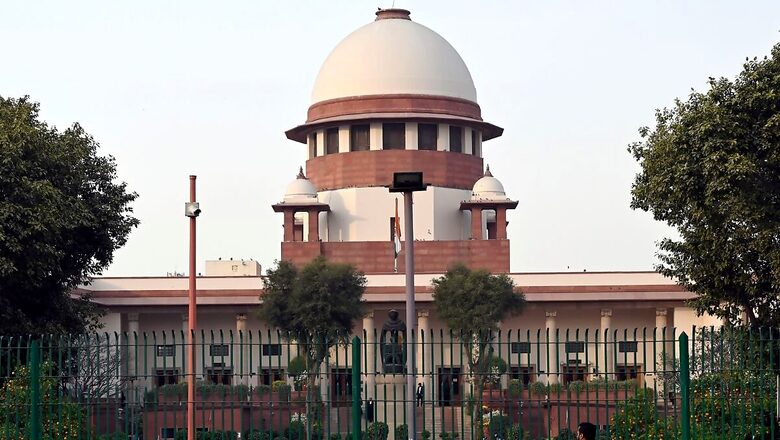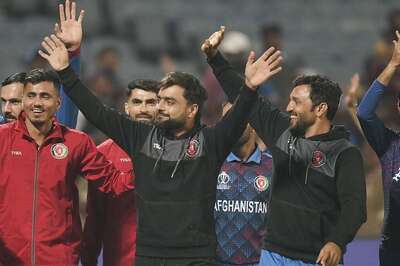
views
There cannot be any quality education if a student is sought to be penalised on the ground that he belongs to a particular community, the Supreme Court Monday said, as it pulled up the Uttar Pradesh government for shoddy probe in a case where a Muslim schoolboy was allegedly slapped by his classmates on the instruction of his teacher in Muzaffarnagar.
Voicing displeasure over the incident, the top court directed the UP government to appoint a senior IPS officer within a week to probe the case.
“The teacher asked the students to beat the victim because of his religion. What kind of education is being imparted?” it said.
A bench of Justices Abhay S Oka and Pankaj Mithal, while directing that the IPS officer shall file a report in the apex court, asked the state government to conduct counselling of the victim and other students involved in the incident by professional counsellors.
“There cannot be any quality education if a student is sought to be penalised on the ground that he belongs to a particular community. There is a prima facie failure on the part of the State to comply with mandatory obligations of RTE Act and relevant rules,” the bench said in its order.
It was hearing a plea filed by Tushar Gandhi, the great-grandson of Mahatma Gandhi, seeking speedy investigation in the case.
The top court, which perused the status report filed by the Muzaffarnagar Superintendent of Police, said it has “serious objections” to the manner in which the FIR was registered after a long delay. It said the father of the victim has made specific allegation that his son was beaten in school due to his religious faith.
“The complaint filed by the student’s father related to cognizable offences but no FIR was immediately registered. Only a non-cognizable report was filed initially and the FIR was registered after a long delay on September 6, almost two weeks after the incident. The father’s allegations were not mentioned in the FIR…This is about quality education. Quality education includes sensitive education,” the bench said.
It recorded in its order that if the allegation is correct, this may be the worst kind of physical punishment imparted by a teacher inasmuch as the teacher directed other students to assault the victim.
Additional Solicitor General KM Nataraj, appearing for the UP government, said the communal angle in the case was blown out of proportion.
The bench refused to agree with his submission and said there is a video of the incident. “….it is a very serious issue and we will go deep into it. The manner in which this incident has happened should have shocked the conscience of the State,” it said.
The court also took exception to the fact that counselling of the victim was done by the district welfare officer, and said this should have been done by a professional counsellor and that too of all the students involved in the incident. “Counselling of the students including the victim has to be done by experts. This case should be investigated by a senior IPS officer and we would not let it to be watered down. We also want to know when the charge sheet will be filed and what protection is given to the witnesses and the victim,” the bench told Nataraj, and asked him to file a report.
It said the state must take responsibility for the education of the child as “it is a case of violation of the fundamental right of the child and the rules framed by UP for the right to free and compulsory education”.
The bench said the IPS officer, to be appointed by the state government, should also go into the question of whether section 153A of IPC (promoting enmity between different groups on grounds of religion, race, place of birth, residence, language) should be invoked.
Referring to the provisions of Right to Education Act and the corresponding rules, which prohibit mental and physical harassment of students and their discrimination, the bench said under the Act, the local authority is required to ensure that no child is subjected to caste, class, religious, or gender abuse or discrimination in school.
“So, there cannot be any religious abuse in a school,” the Court observed and added, “The State will have to answer the important question as to what facilities it will extend to the victim of the offence under the RTE Act for his quality education as per the Act. The State cannot expect the child to continue in the same school.” It also rejected Natraj’s submission that the petitioner has invoked his status of great-grandson of Mahatma Gandhi in the petition and said it can even treat the petition as a suo motu proceeding, considering the fact that it raises allegations of state inaction and violation of fundamental rights.
“In a case like this, the state should not be concerned with the locus of the petitioner, inasmuch as this is a case where not only was the criminal law process not set in motion, but there was a violation of fundamental rights and RTE Act,” it said.
The top court also impleaded the secretary of UP Education Department as a party to the case and sought a report from him on counselling of the students and better educational facilities for the victim.
The bench said after looking at all the reports on October 30, it will consider whether any further directions are required to be issued.
It also directed the state government to place on record the detailed guidelines laid down by the National Commission for Protection of Child Rights (NCPCR) about imposing physical punishment on students.
The Muzaffarnagar Police had booked the teacher accused of making communal comments and allegedly ordering her students to slap a Muslim classmate for not doing his homework.
The school was also served a notice by the state education department in connection with the matter.
The teacher was booked after a video showed her allegedly asking students to slap the Class 2 boy in Khubbapur village and also making a communal remark.



















Comments
0 comment